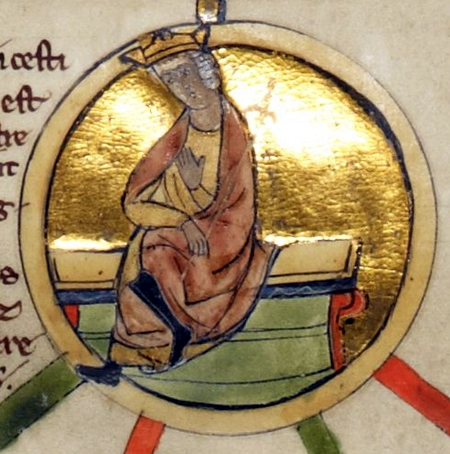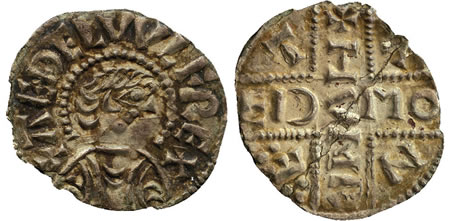Æþelwulf (meaning “noble wolf”) was King of Wessex from 839 until 858. He conquered Kent, on his father’s behalf in 825, and was crowned King of Kent, subregulus to Ecgberht. Upon his father’s death in 839, Æþelwulf became King of Wessex while Æþelstan (his eldest son) assumed the role of sub-king of Kent.
King Æþelwulf appears to have been a devoutly religious man with little political acumen. Additionally, he was “blessed” with numerous ambitious and capable children (e.g., Æþelstan, Æþelswið, Æþelbald, Æþelbert, Æþelred, Alfred). He was involved in many battles (e.g., Carhamton, Acleah) at a time when invasions in Europe were growing more and more frequent. According to the Anglo-Saxon Chronice, his victory at Acleah, fought alongside his son Æþelbald, resulted in “the greatest slaughter of heathen host ever made”.
One of his first acts as king was to divide his kingdom between himself and his son, Æþelstan. Æþelwulf kept the western half of Wessex for himself. In 853, he sent four year old Alfred, his youngest son, to Rome. After the death of his wife, Osburga, he traveled to Rome in 855 where he lavished gifts upon the clergy of St. Peter’s. It was on this trip that he married 12-year old Judith, a Frankish princess and great-granddaughter of Charlemagne. Upon his return (but probably before), he learned that his son Æþelstan was dead. Æþelbald, the next in line, conspired with the Ealdorman of Somerset and Bishop of Shelbourne to oppose his return. Æþelwulf mustered support for a civil war against his son, but instead of sending him and his conspirators into exile, he ceded western Wessex to him.
He died in 859 and was buried at Steyning. He was later re-interred at the Old Minster in Winchester. His bones were later distributed between several mortuary chests in Winchester Cathedral.
- Coin images from “CoinArchives.com World Coins Home“
- “Æthelwulf of Wessex“, Wikipedia


